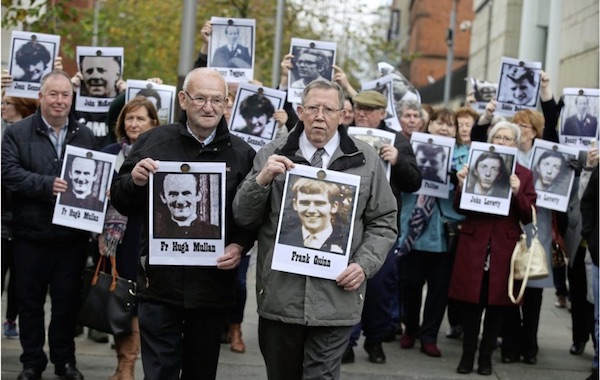
Britain’s Direct Ruler in Ireland, Karen Bradley, has been widely condemned for comments that families of victims of British war crimes are part of ‘the problem’ for seeking coronial inquests, and that she was ‘outraged’ by the legal pursuit of the soldiers involved.
The comments were made by Bradley while she was attending the Westminster parliament’s ‘Northern Ireland Affairs Committee’.
Asked about creating a statute of limitations for British soldiers and other military personnel accused of crimes, Bradley said it wouldn’t stop inquests from taking place.
“Those inquests are much of the problem, they are civil matters, they are not criminal and no statute of limitations could end those,” she said.
Sinn Fein’s Michelle O’Neill described the comments as “highly offensive” and “traumatic to families of victims”.
“The comments by Karen Bradley are entirely unacceptable and a fundamental breach of her government’s supposed support for the legacy proposals agreed at Stormont House,” she said.
“The British Secretary of State needs to clarify if she is rowing back from commitments made on legacy by the two governments and the political parties in the Stormont House Agreement.
Families seeking the right to an inquest are not ‘the problem’, said Ms O’Neill.
“The problem is that the British State continues to deny families access to the truth and to due legal process.
“Karen Bradley may well be outraged about but her anger is centred on the fact that State forces might actually be exposed and held accountable for crimes they committed during the conflict.
“Her suggestion that the judicial system is biased against British state forces is absurd and she must stop interfering in the judicial process.”
JOHN McKERR
Meanwhile, the inquest into the Ballymurphy massacre has heard the final family testimonies.
Anne Ferguson wept as she told the inquest into John McKerr - one of 10 people shot dead by British soldiers in a small west Belfast community over 36 hours - her family need to “set the record straight” about his death.
British military officials briefed the media in 1971 that the father-of-eight “had a gun in his right hand”, despite him having lost that hand while serving in the British army during the Second World War.
“It would have been important for our daddy to have the misreporting corrected,” she told coroner Mrs Justice Keegan.
“My father had been a soldier in the British army in the Royal Engineers.
“He was proud of his military career and was a member of the British Legion. He would not have wished to be associated with any paramilitary or terrorist organisation.”
The family discovered Mr McKerr was critically injured after his daughter Maureen read it in a newspaper as she waited for a lift to work: ‘A Willie John McKerr had been shot and wounded in the Whiterock Road area the day before’.
“Mo showed her [mother] the newspaper and she says she can remember Mum’s screams to this day,” Mrs Ferguson said.
Mr McKerr died in the hospital a week after the shooting. His youngest child, eleven-year-old Bernadette, tried to visit him before he died but was “advised by a nurse not to go to see him but to remember him as he had been”.
JOHN LAVERTY
Meanwhile, Carmel Quinn told the coroner her brother John Laverty “is not just another statistic of the conflict”.
“He was a son, a brother, an uncle. He was deeply loved,” she said.
Mr Laverty, who was just 20 when he was “shot in the back” on August 11 1971, was “called after his uncle John who fought in the Second World War”.
“A kind, loving child who grew up to be a 6-foot-tall laid-back, easy going lad,” he worked for the Belfast Corporation and “to the outside world... was a quiet big fella but in the comfort of our home he was a prankster”.
“John always tried to look after us. He helped our sister Tilly, who had two daughters at the time. He would mind them on a Friday night to make sure Tilly and her husband Edmund could get a night out.”
Their mother Mary McKerr refused to leave her husband and sons when women and children were being evacuated from Ballymurphy ahead of internment, so her 24-year-old daughter Sue went instead with Mrs Quinn and her sister Rita.
“John helped us over to our local community centre, carrying our bags for us.
“I began to cry because I didn’t want to go. I didn’t want to leave my mummy and my family. I remember having a real sense of fear.
“John told me that it would be all right, I was only going on a holiday and when we come home everything would be OK again.
“We got on the bus and left. Our John stood waving to us until we couldn’t see him any more.
“Unknown to us, this would be the last time we would see our beautiful brother.”
When John and his brother Terry went missing, it was 36 hours before their parents found out one was dead and the other arrested and tortured by soldiers and military police.
“One soldier said to [Terry]: ‘I have already shot one Irish b*****d dead, another won’t matter.’ Terry, at this stage did not know he was talking about our John,” Mrs Quinn said.
![[Irish Republican News]](https://republican-news.org/graphics/title_gifs/rn.gif)
![[Irish Republican News]](https://republican-news.org/graphics/title_gifs/harp.gif)

